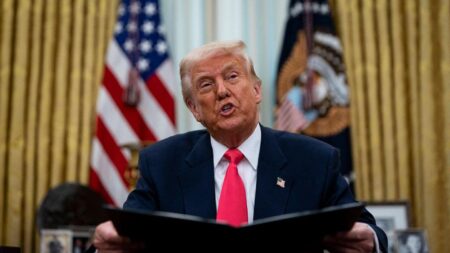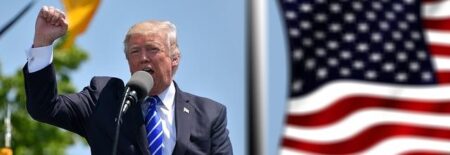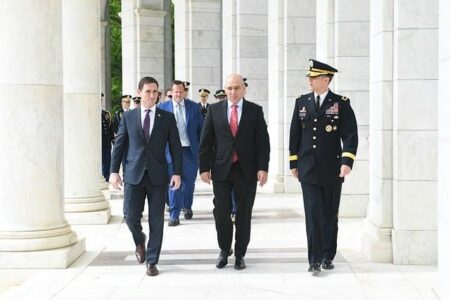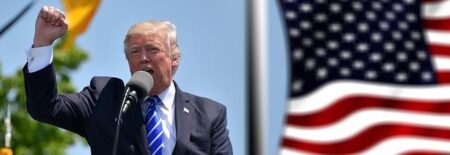China has announced its intention to “resolutely counter” U.S. tariffs, emphasizing a commitment to protect its economic interests amidst increasing trade tensions. The statement reflects ongoing struggles in bilateral relations and potential impacts on global markets.
Browsing: international trade
Mark Carney, renowned for his crisis management, aims to steer Canada through the ongoing trade war. As he navigates economic uncertainties, his leadership is pivotal in shaping fiscal policy and bolstering national resilience against global market fluctuations.
In a recent statement, Donald Trump announced a temporary halt on imposing new tariffs, underscoring their strategic importance in trade negotiations. While he recognizes their potential economic impact, he emphasizes that tariffs remain a critical tool for policy leverage.
In response to escalating tensions in Trump’s trade war, Mexico, Canada, and China swiftly implemented new tariffs on U.S. goods. This retaliatory measure underscores the growing economic strain and uncertainty surrounding international trade relations.
As the US trade war intensifies, China is set to increase food imports from Latin America and Europe. This strategic shift aims to diversify its supply sources and strengthen economic ties, signaling a significant change in global trade dynamics.
Commerce Secretary Lutnick announced that the majority of tariffs on Canada and Mexico are likely to be postponed by one month. This delay aims to facilitate ongoing trade discussions and mitigate potential economic impact on both nations.
Lululemon’s strategic sourcing and production practices position it to sidestep potential tariffs from Trump’s trade policies, while Canada Goose, reliant on U.S.-manufactured materials, may face rising costs. The differing approaches highlight contrasting challenges in today’s trade landscape.
Lindt has announced plans to supply chocolate to Canada from Europe, aiming to avoid tariffs that increased costs for importing goods. This strategic move underscores the company’s efforts to maintain competitive pricing amid international trade challenges.
In a significant shift, key industry leaders express willingness to accept tariff reductions in negotiations with the US. This move is seen as a bid to enhance trade relations and stimulate economic growth, amid ongoing discussions to resolve trade tensions.
As U.S. tariffs on various imports take effect, Mexico, Canada, and China respond with retaliatory measures, targeting American goods. This escalation raises concerns over escalating trade tensions and potential impacts on the global economy.
Canada has stated it will not eliminate its tariffs unless the United States removes all levies, according to a government official. This stance underscores ongoing trade tensions and highlights the complexities of bilateral negotiations.
In a bold economic move, President Trump has imposed tariffs on imports from Canada, China, and Mexico, igniting a trade war that analysts warn could escalate tensions and lead to significant price hikes for consumers across various sectors.
India may avoid the Trump administration’s tariffs set to begin on April 2, according to sources. Negotiations are ongoing, focusing on trade imbalances and tariffs on Indian goods, potentially allowing for exemptions or reduced rates.
In response to President Trump’s tariffs, Canada and China have announced retaliatory measures, raising concerns of an escalating trade war. Both nations aim to protect their economies as tensions heighten in global trade relations.
In a recent statement, former President Trump claimed that U.S. banks are barred from operating in Canada. However, experts argue that financial regulations are more nuanced, and U.S. banks often navigate specific frameworks to establish a presence internationally.
In light of recent statements by Lutnick, speculation is mounting around a potential tariff deal between Canada and Mexico. Market analysts will keenly monitor financial markets for reactions, particularly in sectors heavily reliant on cross-border trade.
Javier Milei’s recent visit to Washington underscores his commitment to promoting freer trade between the U.S. and Argentina. Such a shift could enhance economic ties, boost exports, and foster investment, potentially benefiting both nations’ economies.
China has announced the implementation of additional tariffs ranging from 10% to 15% on a variety of U.S. farm products, a move expected to escalate trade tensions between the two nations. The tariffs target key agricultural exports, impacting both economies.
The Associated Press reports that Trump’s tariffs on Mexico, Canada, and China target a range of goods, including agricultural products, electronics, and vehicles. This trade policy aims to bolster domestic industries but risks escalating tensions and consumer prices.
UK Finance Minister has emphasized the necessity of “give and take” in ongoing negotiations to prevent the imposition of tariffs by the US. This statement reflects concerns over potential trade barriers that could impact UK businesses amid turbulent economic conditions.



















